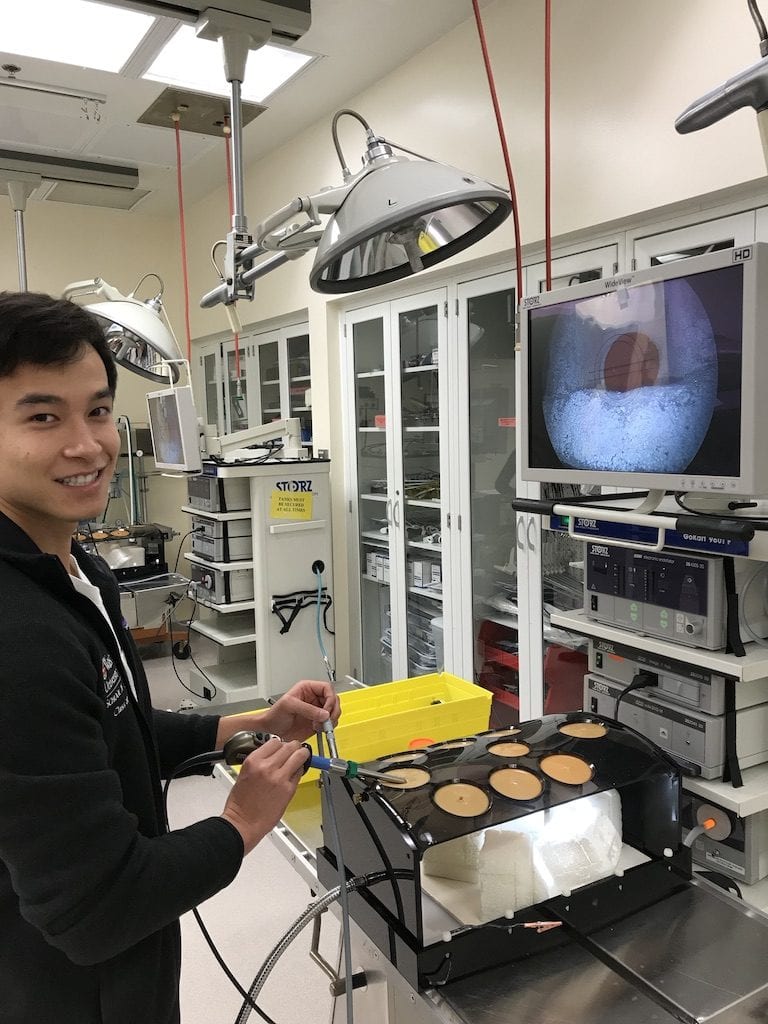Asian Pacific American Medical Student Association (APAMSA)
John D., M1
The WashU chapter of the Asian Pacific American Medical Student Association (APAMSA) is focused on offering opportunities to advance health advocacy for Asian and Pacific American populations. WUSM APAMSA, in conjunction with the St. Louis University School of Medicine APAMSA, regularly hosts health screenings targeting Asian and Pacific American populations. Students get to learn and practice skills such as taking vital signs, taking a history and physical, measuring blood glucose, and conducting vision screenings. APAMSA also has a selective for learning medical Chinese, and hosts multiple events that celebrate Asian Pacific culture, such as Diwali and Lunar New Year Festival. Getting involved in volunteering with APAMSA is a fantastic way to not only practice your basic medical skills but also gain a greater awareness of many of the issues faced by the Asian and Pacific American community.
Business Extracurriculars
Ashwin L., M1
WUSM is within a 10-minute walk of the Cortex, a unique start-up and entrepreneurship hub with which medical students can easily get involved. If you want to try working on that biotech idea that’s been in your head, Sling Health is an incubator that recruits WashU medical students to join one of many project teams looking to invent and innovate. You connect with other health care and engineering students, network with and get feedback from prominent businesspeople, and basically go through an entire new business/startup cycle — all as an M1!
If you want to join a company, Epharmix is a telemedicine startup founded by WashU medical students and run mainly by M1s and M2s. You can use the Epharmix platform to work with physicians to serve a wide patient population by engaging in simple yet innovative telehealth interventions, while conducting research and running clinical trials. It’s a great way to get directly involved in implementing a new health care idea while also connecting with physicians and getting clinical research published.
There’s also the Olin Grand Rounds selective made for and catered to those with a health care business interest (see Adrienne’s blurb in the section on selectives). If you’re a med student with an economics/business passion like me, WashU gives you amazing hands-on opportunities that would be really difficult to find elsewhere — and you can dive straight in during M1!
Graduate Professional Council and Interclass Events
Ziheng X., M1
Leveraging the strength and the breadth of graduate/professional training here at WashU, the Graduate Professional Council (GPC) is designed to provide a platform for the trainees of different graduate programs to interact and learn from each other. More specifically, students have the chance to meet their peers from other schools through various GPC-organized events. Some examples include skating/hiking, service opportunities, and Health Professional Student Leadership Council (HPSLC)-organized case study nights. You will not be disappointed if you are passionate about interdisciplinarity and/or getting to know folks outside of your medical school class!
Grand Rounds
Emily J., M1
Grand rounds are one–hour morning conferences in the hospital offered by a given department. They are usually lecture style: Physicians either talk about a specific technique or practice, or about different cases that they have seen recently. Grand rounds happen pretty early in the morning, but the upside is that they never conflict with classes. Going to grand rounds is a great way to learn about and get a feel for a specialty that interests you. It’s also an interesting way to hear about different clinical applications for material we’ve learned in class, and to be introduced to fields you didn’t know existed. For example, I didn’t know the field of orthopedic surgery oncology was a thing until I went to a fascinating grand rounds session on that exact topic.
NICU Cuddlers
Momo O., M1
As a NICU cuddler, I spend several hours each month at St. Louis Children’s Hospital’s neonatal intensive care unit (NICU), cuddling babies who are upset, as well as interacting with babies who are awake and ready to play. NICU parents cannot always be by their baby’s side, and the nurses, who are often busy with other responsibilities, cannot always hold upset babies. As part of the NICU team, NICU Cuddlers’ goal is to minimize the amount of negative experiences a baby has during their NICU stay. As a student interested in neonatology, I have enjoyed learning more about the NICU environment while having the unique privilege of interacting with NICU babies. On top of that, I’ve found that cuddling babies is an excellent way to de-stress after a hard week of classes!

Shadowing
Gabbie J., M1
Shadowing as a first-year medical student is exceedingly easy. At the beginning of the year, M2s host an activities fair where you can sign up for any of WUSM’s wide range of interest groups. The groups then email out spreadsheets with dates and times, and you can simply put your name down in a slot that works best with your schedule to shadow. In addition to that, you can email physicians not on the sign-up spreadsheet and ask to shadow. Most physicians are more than happy to have you, as they love to teach students; they often take extra time to teach and accommodate you. It’s also possible to get hands–on experience while shadowing as a medical student — I’ve taken patient histories and done physicals, put in Foley catheters, and participated in level 1 traumas. It’s a great way to reinforce the things that you are learning, to explore all the different specialties, and to get to know the faculty.